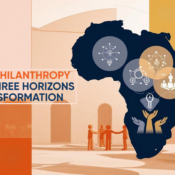Decoding Development Buzzwords: Understanding the Meaning of Localization and Decolonization
By Adama Coulibaly, Director of Global Programs at Oxfam International
Adama Coulibaly dissects commonly used terms in development, discussing their inherent power and politics and how we can go beyond the surface to use them in ways that lead to positive transformation.
The global development sector is often rife with jargon and buzzwords that can influence not only the conversations, but also the actual policies and practices that guide development work. Two such terms, “decolonization” and “localization,” have been making the rounds in recent conversations. The paradox is that despite their frequent use, they are often misunderstood, misapplied, or, more problematically, used in an empty way without any real adherence to their principles. Seen in this light, such buzzwords present both challenges and exciting opportunities for global development work. Highlighting this duality is the focus of this article.
Consider an all-too-familiar scenario in global development conversations. Thomas, a representative of the Global North, suggests that their international NGO is promoting development decolonization in Africa by exporting its home-grown solutions to local people. In response, local leader Mariama argues that true decolonization is not about transplanting external techniques and approaches, but about strengthening local capacities, knowledge, and solutions, and enabling local leadership in development.
Such interactions illustrate the persistent misconceptions that surround decolonization and its seductive companion, localization—two concepts that are often entangled in divergent interpretations. Used correctly, they present a transformative vision for development, shaping it into a more inclusive, equitable, culturally respectful, and sustainable endeavor. Conversely, misunderstood, they can inadvertently reinforce the negative power dynamics they seek to reconfigure.
Decolonization is about dismantling the legacies of colonialism embedded in global development systems, policies, and practices. It challenges historical injustices and modulates power dynamics between and within the Global North and South. Such a rebalancing actualizes local narratives, experiences, and views at the heart of development, and promotes self-determination, cultural preservation, and an appreciation of local contexts, histories, and knowledge. Thus, decolonization can be equated with peeling back layers of colonial imposition to reveal the authentic history, beauty, and wisdom of local societies.
Localization, its parallel counterpart, seeks to distribute resources, control, authority, and leadership more equitably to local actors in the global development sector. It empowers local communities, builds local capacity, and promotes sustainability by valuing and leveraging local knowledge and resources. In essence, localization fosters an indigenous ecosystem that allows development solutions to flourish naturally and resiliently.
Despite these empowering visions, however, misconceptions persist. Often, decolonization is reduced to a shallow tick-box exercise that overshadows the need for deep, structural changes in development work. This simplification leads to continued dominance and control by international actors behind the mask of ‘decolonization’. Similarly, localization is often misinterpreted as a purely symbolic act without substantive shifts in power dynamics. While the rhetoric around the principle is encouraging, the lived reality can be disappointing, perpetuating dependence on external support. These challenges and misconceptions underscore the need for a clear understanding and effective implementation of these concepts.
To truly turn these buzzwords into action in global development, I recommend four practical strategies. It is critical that we foster diverse dialogues, allow local voices to be heard and valued, and promote participatory decision-making. We must prioritize transparency and clarity in communication to align all stakeholders around a shared vision of development and build trust and understanding. Accountability is key to holding international NGOs accountable to their local partners, ensuring that the principles of decolonization and localization are embedded. Finally, comprehensive education and awareness-raising programs are essential to fostering a deeper understanding of and adherence to these principles and to shaping more nuanced and effective practices. The urgency and necessity of these actions cannot be overstated.
In conclusion, while the buzzwords of decolonization and localization pose challenges due to misinterpretation and misconception, they also present a profound opportunity. They can reshape global development towards a more just, respectful, and sustainable future. With informed and deliberate use, these concepts can help dismantle colonial legacies and, importantly, empower local actors and communities to take the lead in directing development initiatives. This potential for change should inspire us all.
About the author
Adama Coulibaly is a seasoned development professional committed to social justice, children’s rights, and gender equality. With more than three decades of experience in international development and humanitarian action, he has held senior leadership positions with renowned organizations such as Plan International, the International Rescue Committee, and the United Nations. Currently, Adama is the Director of Global Programs for Oxfam International, overseeing operations in 60+ countries across four regions. A writer and prolific blogger, he shares positive thoughts on leadership and social awareness. Dedicated to mentoring African young people, he seeks to inspire resilience and commitment, believing in their potential to build a free, united, and prosperous Africa.
References
- Centre for Humanitarian Leadership. Combining evidence and practice for better humanitarian action.
- Chambers, R. (1997). Whose Reality Counts? Putting the First Last. Intermediate Technology Publications Ltd. (ITP).
- Featherstone, A. (2016). Time to Move On: National Perspectives on Transforming Surge Capacity. ActionAid.
- Keahey, J. (2023). Valuing Local Knowledge: Insights from South Africa’s Multi-Ethnic Heritage. Journal of Sustainable Development, 16(1), 45-58.
- Mathews, D. (2021). Are Country Offices Preventing Us from Decolonizing Development? Bond.
- Pallister-Wilkins, P. (2021). Saving the souls of white folk: Humanitarianism as white supremacy. Security Dialogue, 52(1_suppl), 98-106.
- Pledge for Change 2030. Re-imagining the role of INGOs in the global humanitarian and development aid system.
- Roepstorff, K. (2020). A Call for Critical Reflection on the Localization Agenda in Humanitarian Action. Third World Quarterly, 41(2), 284-301.
- Smith, L. T. (2021). Decolonizing Methodologies: Research and Indigenous Peoples. Zed Books.
- Vera, C. et al. (2021). Local Humanitarian Leadership: The View from Local Actors. Oxfam International.



